 |
| Aroon Purie, CEO, India Today Group: Asking
that vital question |
Yes,
for the record, industrialists at the India Today Conclave did break
into a jig on news of India's cricket victory over Pakistan, on
March 1st. But the August gathering's collective mind, as focused
by India Today Group CEO Aroon Purie in his opening remarks, was
on India's prospects as a global giant. The star of the event: William
Jefferson Clinton, USA's 42nd president, and thought-provoker-in-chief.
Addressing the Conclave, moments after the victory, live via satellite
from New York, Clinton was as eloquent as ever. With appropriate
charm, he hailed India's great culture, learning and economic prospects,
but also reminded us that India's destiny as a great nation will
continue to elude it so long as the madness of subcontinental conflict
continues.
If that was the high point, the tone had been
set by the Sri Lankan premier Ranil Wickremesinghe, who kicked off
with the need for collective growth strategies for South Asia. Indian
president A.P.J. Abdul Kalam spoke of peace, and of spiritual transformation.
India's stature as a giant-to-be was almost implicit, as speaker
after speaker waxed bullish on India's role in the emerging world
economic order. Key issues, from democracy to judicial reform-even
'soft power'-sparked lively discussions. Rarely have so many great
minds exchanged thoughts so freely.
DEMOCRACY A DRAG?
Pramod Mahajan
General Secretary, BJP
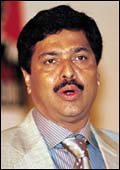 It
is time the leaders started behaving as persons elected by the majority
but working for all," said Pramod Mahajan, for whom the choice
is not between democracy and an alternate form of government, but
between "effective governance" and the lack of it. The
ex-minister laid down the 'five Ps' of Indian democracy-politician,
party, parliament, people and "permanent government" (the
bureaucracy). "They function as a parallel government and often
the best of intentions of ministers get derailed," he complained. It
is time the leaders started behaving as persons elected by the majority
but working for all," said Pramod Mahajan, for whom the choice
is not between democracy and an alternate form of government, but
between "effective governance" and the lack of it. The
ex-minister laid down the 'five Ps' of Indian democracy-politician,
party, parliament, people and "permanent government" (the
bureaucracy). "They function as a parallel government and often
the best of intentions of ministers get derailed," he complained.
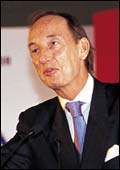 Kenneth
Courtis Kenneth
Courtis
Vice Chairman, Goldman Sachs, Asia
If the last century was about the rise of the
Americas," said Kenneth Courtis, "then this millennium
may well be the story of the rise of China and India." On reforms,
Courtis wanted India to take lessons from China. But what about
democracy? A vital wheel of progress, and certainly no impediment
to growth. The world's largest democracy, he reaffirmed, has all
the makings of being a global economic power.
THE KEYNOTE SPEAKERS
Ranil Wickremesinghe
Prime Minister, Sri Lanka
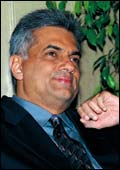 Let's
exploit synergies in a south Indian-Sri Lankan sub-regional economic
zone," said Ranil Wickremesinghe, the man whose statesmanship
is still being talked about, thanks to his dramatic peace offer
to the Tamil Tigers. The core of his argument was economic, urging
greater trade with India, backed by the offer of "cost-effective
access to world markets through the ports of Colombo and Trincomalee".
His suggestion: regional and sub-regional trade blocs. "The
only way to prosperity in the region is through cooperation and
creating effective economic relations," he made plain. No matter
what frictions dog bilateral relationships in the region, he pleaded,
trade and commerce must never suffer-for that's lose-lose. Let's
exploit synergies in a south Indian-Sri Lankan sub-regional economic
zone," said Ranil Wickremesinghe, the man whose statesmanship
is still being talked about, thanks to his dramatic peace offer
to the Tamil Tigers. The core of his argument was economic, urging
greater trade with India, backed by the offer of "cost-effective
access to world markets through the ports of Colombo and Trincomalee".
His suggestion: regional and sub-regional trade blocs. "The
only way to prosperity in the region is through cooperation and
creating effective economic relations," he made plain. No matter
what frictions dog bilateral relationships in the region, he pleaded,
trade and commerce must never suffer-for that's lose-lose.
The Sri Lankan pm's speech, the first, after
India Today Group CEO Aroon Purie threw the forum open, was peppered
with anecdotes from history and laced with humour ("I am more
worried about the Lanka-Windies match" came the reply, when
asked about the outcome of the India-Pakistan match). The Q&A
session was dominated by trade-speak. "Anything India does
has a direct impact on Sri Lanka. India's growth is our growth also,"
said the pm. Industrialist Adi Godrej's suggestion? Perhaps the
moribund India-Pakistan trade can be revived by routing it through
Sri Lanka!
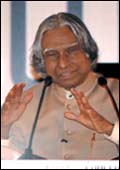 A.P.J.
Abdul Kalam A.P.J.
Abdul Kalam
President Of India
We have evolved great qualities of leadership
to manage a nation of a billion people," said India's President,
"Now we should not allow any religion or individual fanaticism
to endanger our nation. Because the nation is important, compared
to any individual, or party or religion."
Not that India's first, well, rocket scientist
president didn't have any new thoughts to offer, as he went about
his power point presentation-meticulously prepared with inputs from
speeches by Clinton and Toffler earlier-at the Conclave's concluding
session. To Kalam, statehood isn't some sterile concept, devoid
of any higher-order meaning or unifying soul. Without agonising
over cosmological insights and the like, spiritualism can and must
be a part of it. "Economic strength alone has no meaning. Economic
prosperity and military strength alone do not bring peace to any
nation, as we see from the dynamics of the world. In such a situation,
it's also very important to transform our religious forces into
spiritual forces," he said, passionately urging the country
to unleash its huge creative reserves. And to dream, dream big.
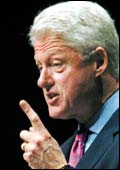 Bill
Clinton Bill
Clinton
Former President, USA
No question, bill Clinton was the toast of the
Conclave delegates-even if US security held him back in New York.
Thank goodness for satellite-a technology that had beamed in India's
glorious cricket victory against Pakistan just moments before the
most outspoken Indophile ever to occupy the White House spoke. Clinton
got the Conclave to sober up in no time, though-by dropping the
K-word. Kashmir remained a flashpoint, he said, worrying that "Politicians
on both sides of the line may have more to gain in the short run
by keeping problems going on than making them go away". His
suggestion: use the peace process in Northern Ireland as a model.
Only then could global gianthood become reality.
Clinton was frank about nuclear weapons, the
aids bomb and sectarian violence stunting India, as he saw it. "Nuclear
weapons cannot be the definition of national greatness," he
said. And "aids is one of the things that can totally derail
India's march to prosperity." On sectarian violence, the big
man from Little Rock expressed grave sadness over Gujarat 2002.
"To identify and categorise people on the basis of faith will
keep India from becoming the right kind of giant in the 21st century,"
he warned.
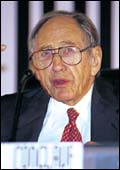 Alvin
Toffler Alvin
Toffler
Futurist
We are living in turbulent, rapidly changing
times," said Alvin Toffler, whose Future Shock has held generations
of Indians spellbound (and looking forward to the information Third
Wave). At the Conclave, he was no less mesmerising. "It's a
fantastic time to be alive," he judged, looking into his crystal
ball for India's future stature.
And? For India, it's time to choose whether
it wants to leap to the ranks of Third Wave nations that are determining
the e-future. Being a digital adapter is no good, India must lead
the change. "The battle between the US and other societies
is an example of how the First and Second Wave nations are trying
to catch up with the Third Wave one," he continued, offering
all manner of mindboggling figures (example: there are 50 million
digital switches for every human being). "The world is now
witnessing a trisection of power-the poor First Wave nations, the
mass manufacturing Second Wave ones and the knowledge economies
of the Third Wave," he said. And India? Divided into all three
together.
JUDICIARY A HURDLE OR CRADLE?
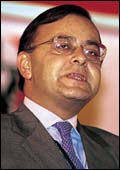 Arun
Jaitley Arun
Jaitley
Union Minister Of Law, India
Is the Indian judiciary
a hurdle or a cradle for development? If judicial reforms proceed,
all will be well, said Arun Jaitley, who wanted the courts to restrict
their role to interpreting the law (and not succumb to their increasing
tendency to lay down policy). "The incidence of courts' taking
over the role of the legislature is clearly not a good sign,"
he said, expressing added concern about the low conviction rate
in the criminal justice system.
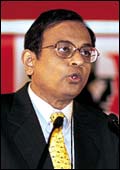 P.
Chidambaram P.
Chidambaram
Former Finance Minister, India
Hurdle? not at all. Practising lawyer and India's
former finance minister, P. Chidambaram, highlighted the judicial
system's role in safeguarding Indian citizens' human and constitutional
rights, but worried about biases creeping in. "While it is
right of the courts to back the liberalisation process," he
said, "they should be far more careful in their scrutiny."
His other worry: rising scot-free crime.
HAS THE INDIAN ECONOMY
MISSED THE BUS?
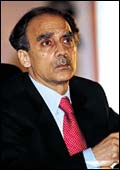 Arun
Shourie Arun
Shourie
Union Disinvestment Minister, India
Has the economy
missed the bus? No, said Arun Shourie, the reforms are very much
in progress. "Don't allow people to create a fear psychosis
on reforms," he advised, "don't allow vested interests
to resume the debate on the type of government India should have,
and don't wait for consensus." In a typically hard-hitting
speech, he pointed out that India was over-stocked with ideas for
accelerating the Indian economy. "The trouble is, they have
not been implemented."
 T.N.
Srinivasan T.N.
Srinivasan
Professor, Yale University
India has been on the reform path for the last
12 years, and yet has not been able to keep pace with not just China,
but many other ASEAN and Latin American nations," rued T.N.
Srinivasan, another noted champion of reforms. For him, the tragedy
was the inherent contradictions in the Indian system, compounded
by economic mismanagement (on the fiscal front, for example). His
demand: a proactive approach to reforms.
CAN INDIAN STATES WORK
TOGETHER?
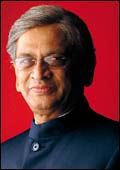 S.M.
Krishna S.M.
Krishna
Chief Minister, Karnataka
Can they? Why, they must, said S.M. Krishna.
''It is essential to share not just experiences but also resources
for mutual benefit.'' It's an urgent matter-of fighting poverty
afflicting all of India.
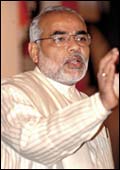 Narendra
Modi Narendra
Modi
Chief Minister, Gujarat
The Gujarat cm made a case for cooperation on
national projects. ''Good governance is all about expanding the
substantive freedoms that people enjoy as a result of just, humane
and sustainable development.''
CAN INDIAN ENTERTAINMENT BE BE A GLOBAL PHENOMENON?
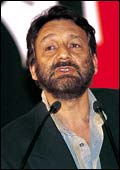 Shekhar
Kapur Shekhar
Kapur
Film Director
Don't look at Bollywood,'' said Shekhar Kapur.
Why? Last year, Spiderman made $150 million (Rs 720 crore) in its
first week. Ten years from now, it will make $1 billion (4,800 crore),
and $700 million (Rs 3,360 crore) of that will come from Asia. Bollywood
must wake up to global market forces.
COST OF ENMITY BETWEEN INDIA AND PAKISTAN
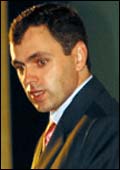 Omar
Abdullah Omar
Abdullah
President, National Conference
When a second standard student starts calling
Pakistan 'the enemy', the signs are ominous,'' said Omar Abdullah.
Despairing, but still resolutely hopeful. ''Time has come for leaders
to behave as leaders,'' he implored, ''not servants of public opinion-but
makers of public opinion''.
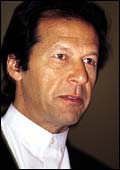 Imran
Khan Imran
Khan
Politician, Tehrik-e-Insaaf
There is no option before the two nuclear powers
but to come to some form of understanding and arrangement,'' said
Imran Khan. ''Otherwise, it may well lead to disastrous consequences.''
Leaders must start talking, added the man for whom ''justness''
of society is a measure of greatness.
|

